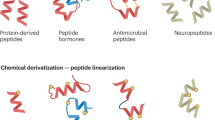Summary
α-Amidation is a terminal modification in peptide biosynthesis that can itself be rate-limiting in the overall production of bioactive α-amidated peptides. More than half of the known neural and endocrine peptides are α-amidated and in most cases, this structural feature is essential for receptor recognition, signal transduction, and thus, biologic function. This chapter describes methods for developing and using analytical tools to study the biology of α-amidated peptides. The principle analytical method used to quantify α-amidated peptides is the radioimmunoassay (RIA). Detailed protocols are provided for 1) primary antibody production and characterization; 2) radiolabeling of RIA peptides; 3) sample preparation; and 4) the performance of the RIA itself. Techniques are also described for the identification and verification of α-amidated peptides. Lastly, in vivo models used for studying the biology of α-amidation are discussed.
Access this chapter
Tax calculation will be finalised at checkout
Purchases are for personal use only
Similar content being viewed by others
References
Czyzyk, T. A., Ning, Y., Hsu, M. S., Peng, B., Mains, R. E., Eipper, B.A., and Pintar, J. E. (2005) Deletion of peptide amidation enzymatic activity leads to edema and embryonic lethality in the mouse. Dev Biol. 287, 301–313.
Eipper, B., Stoffers, D., and Mains, R. (1992) The biosynthesis of neuropeptides: peptide _-amidation. Annu. Rev. Neurosci. 15, 57–85.
Itoh, S. (2006) Mononuclear copper active-oxygen complexes. Curr Opin Chem Biol. 10, 115–122.
Prigge, S. T., Mains, R. E., Eipper, B. A., Amzel, L. M. (2000) New insights into copper monooxygenases and peptide amidation: structure,mechanism and function. Cell Mol. Life Sci. 57, 1236–1259.
Klinman, J. P. (2006) The copper-enzyme family of dopamine beta-monooxygenase and peptidylglycine alpha-hydroxylating monooxygenase: resolving the chemical pathway for sub strate hydroxylation. J Biol Chem. 281, 3013–3016.
Kulathilia, R., Merkler, K. A., and Merkler, D. J. (1999) Enzymatic formation of C-terminal amides. Nat. Prod. Rep. 16, 145–154.
Driscoll, W. J., Mueller, S. A., Eipper, B. A., and Mueller, G. P. (1999) Differential regulation of peptide α-amidation by dexamethasone and disulfiram. Mol. Pharm. 55: 1067–1076.
Domon, B. and Aebersold, R. (2006) Mass spectrometry and protein analysis. Science 312, 212–217.
Reinders, J. and Sickmann, A. (2005) State-of-the-art in phosphoproteomics. Proteomics 5, 4052–4061.
Baldwin, M. A. (2004) Protein identification by mass spectrometry: issues to be considered. Mol. Cell Proteomics 3, 1–9.
Mueller, G. P., Driscoll, W. J. and Eipper, B. A. (1999) In vivo inhibition of peptidylglycine-α-hydroxylating monooxygenase by 4-phenyl-3-butenoic acid. J. Pharmacol. Exp. Thera. 290, 1331–1336.
Mueller, G., Husten, E., Mains, R. and Eipper, B. (1993) Peptide α-amidation and peptidylglycine-α-hydroxylating monooxygenase: control by disulfiram. Mol. Pharm. 44, 972–980.
Kolhekar, A. S., Roberts, M. S., Jiang, N., Johnson, R. C., Mains, R.E., and Eipper, B. A. (1997) Neuropeptide amidation in Drosophila: separate genes encode the two enzymes cata lyzing amidation. J. Neurosci. 17, 1363–1376.
Kuo, Y. M., Zhou, B., Cosco, D., and Gitschier, J. (2001) The copper transporter CTR1 provides an essential function in mammalian embryonic development. Proc. Natl. Acad. Sci. U S A. 98, 6836–6841.
Steveson, T. C., Ciccotosto, G. D., Ma, X. M., Mueller, G. P., Mains, R. E., and Eipper, B. A. (2003) Menkes protein contributes to the function of peptidylglycine alpha-amidating monooxygenase. Endocrinology 144, 188–200.
Shiosaka, S., Kiyama, H., Wanaka, A., and Toyama, M. (1986) A new method for producing a specific and high titer antibody against glutamate using colloidal gold as carrier. Brain Res. 382, 399–403.
Author information
Authors and Affiliations
Editor information
Editors and Affiliations
Rights and permissions
Copyright information
© 2008 Humana Press, a part of Springer Science+Business Media, LLC
About this protocol
Cite this protocol
Mueller, G.P., Driscoll, W.J. (2008). α-Amidated Peptides: Approaches for Analysis . In: Kannicht, C. (eds) Post-translational Modifications of Proteins. Methods in Molecular Biology™, vol 446. Humana Press. https://doi.org/10.1007/978-1-60327-084-7_5
Download citation
DOI: https://doi.org/10.1007/978-1-60327-084-7_5
Publisher Name: Humana Press
Print ISBN: 978-1-58829-719-8
Online ISBN: 978-1-60327-084-7
eBook Packages: Springer Protocols




